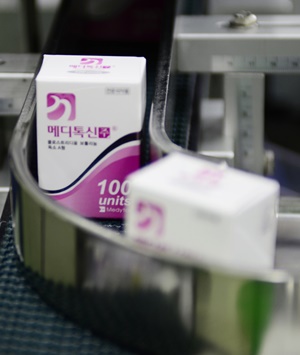Medytox, the Korean botulinum toxin maker, is suspected of breaching Good Manufacturing Practices (GMP) on pharmaceutical products, according to complaints filed at the nation’s anti-corruption and civil rights commission.

Anti-Corruption and Civil Rights Commission said it received multiple complaints about Medytox.
Among the alleged suspicions are: Medytox manipulated a chart as if it had sterilized the freeze dryer during the manufacturing of its botulinum toxin Meditoxin, but it did not; the company intentionally replaced the serial number of a normal product with that of a defective product to reduce the ratio of faulty goods; and the company violated the Pharmaceutical Affairs Act by using the raw material for experiments in products for sale.
The Ministry of Food and Drug Safety on Thursday made an urgent inspection on Medytox’ First Plant in Ochang, North Chungcheong Province. The inspection aimed to check if the factory complied with the aseptic processing, and there was no problem in quality control.
According to a report by News 1, the informer, a former Medytox employee, said the company did not follow the sterilization manufacturing procedures even though botulinum toxin injections, biological agents, need complete sterile procedures. “To cover this up, it fabricated the chart as if it had the sterilization process,” the informer said.
The whistleblower said the company committed this act because its plant had little space to expand the facilities for sterilization while the company increased the output. In 2007, the company doubled the production of botulinum toxin from 2,500 vials and replaced the freeze-dryer with a larger one.
However, the company could not expand the steam generating device, and it made it difficult to sterilize the entire products, the informer said.
Although the company resolved the issue by constructing a third plant in 2017, it has sold unsterilized botulinum toxin products for over a decade, the informer claimed. As the company still operates the first factory, it might be selling some of the unsterilized goods, the source added.
On May 21, another complaint about Medytox was filed at the anti-corruption commission, alleging that it intentionally replaced the serial number of a normal product with that of a defective product to reduce the ratio of defective goods and that it used raw materials for experiments in products for sale.
If the allegations are true, they are recognized as a serious violation of GMP.
“The high rate of defective products means that the product quality is not constant and the manufacturing process is not stabilized. There is a high probability of problems,” said a researcher in charge of quality control at a biopharmaceutical firm. “Deleting and replacing the manufacturing number of a defect product is a violation of Data Integrity, a grave issue. It may be a reason to cancel GMP certification.”
Another researcher also said, “Because a raw fluid material for experiments is unverified in safety, efficacy, and stability by the food and drug ministry, it should not be used for sale even if it passed the quality control lab’s test.”
If the suspicions are true, questions remain until when the company could have violated GMP. Under Article 53 of the Pharmaceutical Affairs Act, a botulinum toxin has to receive lot release approval from the food and drug safety after the data on manufacturing and quality control of the drug is examined and inspected.
If the production rate of defective products is high, it can be judged that there is a serious problem in the manufacturing process and quality consistency in the ministry’s regular GMP inspection every three years. If Medytox’ replacement of manufacturing numbers occurred in 2006, it might have continued to violate the law to avoid critiques in state tests and regular inspections.
In response to accusations, Medytox said the informer was lying. However, as the informant filed a complaint with the anti-corruption commission, and the suspicions were grave enough to affect the maintenance of the botulinum toxin’s license that the authorities are likely to probe the company, observers said.
An official at the food and drug safety ministry said, “It is important to manage a trust-based system in GMP. If there was a false report, it means the company could have lied in other things. So, we will investigate if the violations occurred and how serious they were,”
If the ministry confirms GMP violations, it could determine the level of administrative punishment, including suspension of drug manufacturing and sales, depending on the content and duration of violations. If defective products are on sale, they could be recalled.

